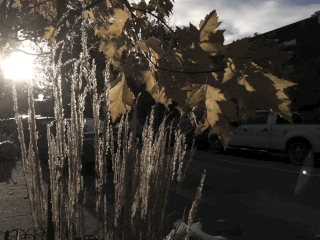
Breathing through the nose
Who hasn’t been told at least once in their life to breathe through their nose? This call for calm hides a simple wisdom. I recently downloaded a meditation application (Calm), intrigued by the good reviews it receives.
Since then, almost every morning, and sometimes in the evening when I can’t sleep, I launch the application which offers me a ten-minute exercise or a real tale to sleep in (much more like an avalanche of so many words that one ends up losing consciousness).
A friend of mine, who also tried the application, said he was annoyed by Tamara Levitt’s voice, which is not my case, maybe simply because the subject is intelligent, accessible as long as you understand English, of course.
One could fear that this type of application only offers superficial exercises based on cheap psychology. Fortunately Calm does not fall into the trap, I think. I already know, in theory because I’ve read it many times, what it says. The short meditation that is proposed is essentially the same, namely to become aware of one’s breathing.
It sounds trivial and yet it is not. That is why, in moments of anger or stress, we are reminded to breathe through that nose that channels everything. Closing your eyes, inflating your lungs with air, feeling the pressure, and then letting go, with your mouth closed so that your breath must pass through the narrow channel of the nostrils, provides a calm that must be strangely tamed.
Impatient, the thought tries to fill the void, Mrs. Levitt’s soft singing airport voice keeps telling us so. It’s not so much to obliterate the powerful machine that it obliterates the brain as to observe it perhaps a little more from a distance. An idea comes to you during your meditation? That’s fine, but don’t let it take over the whole field. Tell her that you have taken note of it and that you will come back to it in ten minutes at the most. If you forget it, it wasn’t that important in the end, but if she comes back, she’ll know to wait until you’ve finished meditating.
The secret is to stop every day. This is similar to those prayers that believers say to each other over and over again. A prayer, in principle, is a melody that should appeal to the breath. By dint of applying this slow exercise of breathing, of calming down, during the day, when you work, when you take the bus, you are surprised to return to the air that enters you and comes out almost immediately. You are alive, in spite of everything that might weigh you down.
Tamara once told me (she told me through the app, it’s just fun to make it a personal conversation) that we used to, for survival reasons that were ingrained in us, judge, separate the wheat from the chaff, good from bad, get irritated because the subway is still crowded, or a colleague told us something bad. We think a lot about what’s coming when it’s often just a matter of suppositions.
These multiple calculations and measurements that the mind loves to think about are valid in themselves. However, if we breathe deeply into them, we can observe them for what they are, pitfalls, joys, the past, the possible future. They are rarely part of our present, which consists of being what we are, the time we are.
No matter if you get the very expensive Calm application (that’s for the bourgeois, that), nothing prevents you from breathing, from observing, for example, through the window, that two drops of water, one on the upper thread, and the other on the lower thread of a clothesline, seem to run together towards an unknown destination. Nothing prevents you from breathing and observing your unfinished apartment and thinking, without judging anything, that it is you who built it and that what remains to be done is what remains to be done.
When you open the door of the building where you work, nothing prevents you from breathing as regularly as you can, seeing you come in, hearing you say hello to people, seeing you concentrate on all those things that should or should not be able to accomplish you.
Maybe this will give you a better understanding of the state of your existence. And if you are suffering a great pain, if you are at the point of death or at the end of a happiness for two, or if you are welcoming a child instead, get a prize, if you are enjoying in the mysterious body of love, I suggest that you do not forget to breathe, and I say this in all humility, because I am not living this drama or these joys that are yours. Let us linger until we can no longer hold our breath and let it go like everything else.
The only purpose of living is to be fulfilled in what has been offered to us. Translated with www.DeepL.com/Translator (free version)

